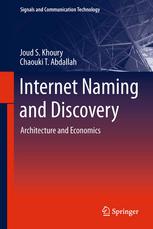

Most ebook files are in PDF format, so you can easily read them using various software such as Foxit Reader or directly on the Google Chrome browser.
Some ebook files are released by publishers in other formats such as .awz, .mobi, .epub, .fb2, etc. You may need to install specific software to read these formats on mobile/PC, such as Calibre.
Please read the tutorial at this link: https://ebookbell.com/faq
We offer FREE conversion to the popular formats you request; however, this may take some time. Therefore, right after payment, please email us, and we will try to provide the service as quickly as possible.
For some exceptional file formats or broken links (if any), please refrain from opening any disputes. Instead, email us first, and we will try to assist within a maximum of 6 hours.
EbookBell Team

4.0
26 reviewsNaming is an integral building block within data networks and systems and is becoming ever more important as complex data-centric usage models emerge. Internet Naming and Discovery is timely in developing a unified model for studying the topic of naming and discovery. It details the architectural and economic tools needed for designing naming and discovery schemes within the broader context of internetwork architecture. Readers will find in this book a historic overview of the Internet and a comprehensive survey of the literature, followed by and an in-depth examination of naming and discovery. Specific topics covered include: • formal definitions of name, address, identifier, locator, binding, routing, discovery, mapping, and resolution; • a discussion of the properties of names and bindings, along with illustrative case studies; • taxonomy that helps in organizing the solution space, and more importantly in identifying new avenues for contributing to the field; • a general model for exploring the tradeoffs involved in designing discovery systems; • an illustrative design exercise for differentiated discovery services; • broad treatment of the main economic issues that arise in the context of discovery; and • a game-theoretic incentive model for route distribution (and discovery) in the context of path-vector routing protocols (mainly BGP). Internet Naming and Discovery will be of great value to readers, including graduate students, engineers and computer scientists, theoreticians and practitioners, seeking a training in advanced networking, or specializing in computer and communications networks.